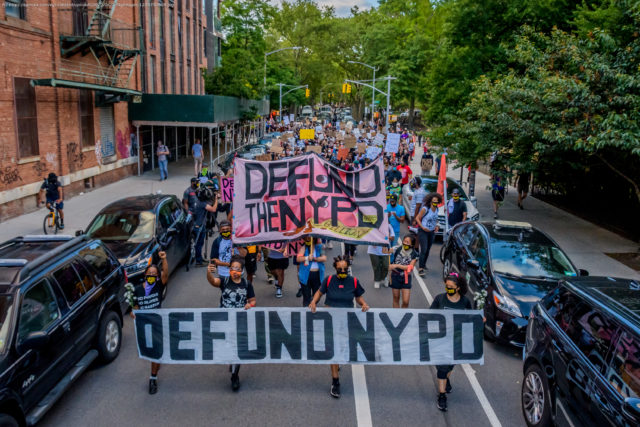First thing to know: Defunding the police isn’t as radical as it sounds.
Whether you’ve been in the streets protesting police violence or merely looked at Twitter, like, once this past week, you’ve likely had the words “Defund the Police” enter your orbit. If your knowledge of the term begins and ends at seeing it on protest sign or as a trending hashtag, it may sound like a radical idea; more of a pipe dream than a potential policy. But while it’s doubtful that you’ll see defunding the police on the national ballot this November — President Trump is campaigning on a platform of “Law & Order” and the presumptive Democratic nominee, Joe Biden, has already signaled that he’s not for defunding the police — the idea seems to be gaining support in a hurry. As more and more people look into how much of a city’s budget is actually spent on policing, how small of an effect that has on driving down crime rates, and the tremendous number of tasks we rely on police officers for, we’re witnessing a paradigm shift in real-time.
This past Sunday, June 7th, the Minneapolis City Council voted to dismantle the city’s police department following George Floyd’s murder at the hands of officer Derek Chauvin with nine votes in favor, giving the city council a veto-proof supermajority. Speaking to CNN, Minneapolis Council President Lisa Bender said:
“We committed to dismantling policing as we know it in the city of Minneapolis and to rebuild with our community a new model of public safety that actually keeps our community safe. [We need] to listen, especially to our black leaders, to our communities of color, for whom policing is not working and to really let the solutions lie in our community.”
Though exactly what the replacement of the police force will look like in Minneapolis isn’t clear, the action wasn’t taken on a whim. The approach was looked at from both budgetary and community-based perspectives and the council clearly decided that they could create a better standard of living without traditional policing. It’s a massive moment in the history of the nation and, with NYC promising to cut the city’s police budget too, it very well may become a trend.
We are going to dismantle the Minneapolis Police Department.
And when we’re done, we’re not simply gonna glue it back together.
We are going to dramatically rethink how we approach public safety and emergency response.
It’s really past due. https://t.co/7WIxUL6W79
Jeremiah Ellison (@jeremiah4north) June 4,2020
In a very basic sense, when people call for the defunding of the police, what they’re asking for is “shrinking the scope of police responsibilities and shifting most of what government does to keep us safe to entities that are better equipped to see that need,” says Georgetown Law School professor Christy E. Lopez, in an article published in the Washington Post. “It means investing more in mental health care and housing and expanding the use of community mediation and violence interruption programs.”
According to Forbes, despite the fact that the level of crime has dropped substantially over the last 30 years, cities throughout the country allocate larger and larger shares of their budgets to law enforcement every year, and today collectively spend $100 billion a year on policing nationwide and $80 billion a year on incarceration. Part of the reason for these ballooning budgets is because of how heavily we rely on them as a society for handling issues that police aren’t trained or equipped to deal with.
Samuel Sinyangwe, the co-founder of Campaign Zero, a data-driven platform that seeks out comprehensive solutions to ending police violence, says we’re simply asking too much of them.
Home
United States
USA — Science The ‘Defund The Police’ Movement — A Definition, Updates, And Resources






